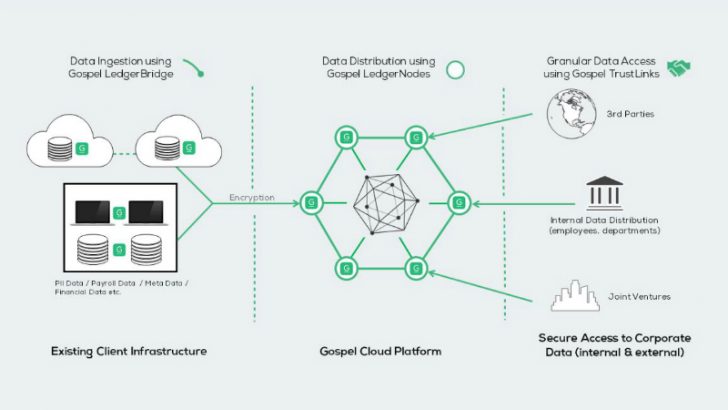
Gospel Technology (Gospel), a provider of secure data distribution for enterprises, has announced the release of Gospel Cloud Platform V2.0. This is a private, permissioned blockchain which enables enterprises to secure and track data across decentralised ecosystems. Gospel believes it offers a new way of securely distributing data across modern decentralised infrastructures. It claims that blockchain can enable enterprises to collaborate on data – both internally and externally – with trust, security and consent.
Version 2.0 builds on Gospel’s initial foundation. It adds multiple enterprise-ready features as well as improvements to performance. It can apply to almost any situation where sensitive information needs sharing yet with protection from internal or external threats (malicious or accidental).
CEO and Founder of Gospel, Ian Smith, commented: “We’re at a pivotal moment in the development of the knowledge economy. Data breaches are becoming such a regular occurrence that consumer trust in allowing companies to hold their data is eroding fast. Only by changing the way we handle data fundamentally can that be reversed before there is a backlash. Gospel delivers an enterprise platform to enable secure data distribution.”

Gospel’s V2.0
By shifting security to the lowest possible layer and adding extensive audit features, Gospel V2.0 claims to deliver a platform which is secure by design. The platform is built around a private, permissioned ledger.
This requires both reads and writes to pass through a distributed consensus mechanism and Gospel’s custom data logic. This means that permissions can be highly granular and context-derived. This includes data-owner driven consent, as well as traditional access control mechanisms. The combination supports Gospel’s central mission – to eliminate the speculative sharing of data by providing mechanisms for companies to share only the information required to perform a process and no more.
By using Gospel, enterprises can aim to:
- eliminate the cause of the majority of data breaches
- move towards compliance with the latest data protection and access regulations.
According to Gospel, V2.0 then goes further. It adds:
- customisable smart contracts for both actions and permissions
- restricted views based on queries to the underlying data (for example, showing whether a user is over 18 rather than individual date of birth information); with this approach, Gospel addresses another vector by which data could inadvertently leak
- the ability to manage and automate workflows end-to-end including interfacing with existing systems for both ingress of data and notification of pertinent information by API, database connection or file; combined with the ability to drive consent through notifications and requests, this means data-consuming users and applications have the latest view of appropriate data at all times.
Gospel Technology
Gospel Technology, headquartered in London, aims to fix data distribution challenges for businesses needing to disseminate critical information, whether internally or externally. Its objective is, in its own words, “total security, trust and control”.
Such an approach offers organizations the possibility of:
- preventing manual workarounds
- eliminating data breaches
- removing human errors
- stopping accidental data loss.
What does it mean
Most enterprises understand traditional IT infrastructures have deteriorating security in an increasingly threat-ridden environment. Gradually, this diminishes both data integrity and then confidence in that data.
Yet, at the same time, the cost of maintaining security across environments continues to increase. Financial information, confidential customer records, intellectual property, personal data, and other unstructured files are all at risk from existing access/trust imbalances.
Gospel’s use of private, permissioned blockchains presents a different approach to the access and control of data. Gospel claims its approach is scalable, resilient and secure – thus providing higher levels of trust in an inherently untrustworthy environment.
Some enterprises, which Gospel does not name as customers, already use the technology. As with all matters concerning security, everything depends on no breaches occurring. This is a tough nut to crack. But Gospel’s V2.0 will be all the more worthwhile if, with its use, enterprises need no longer worry.

























